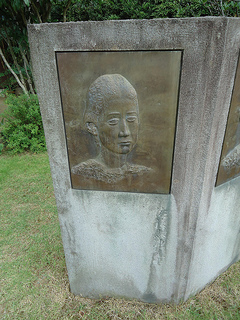Difference between revisions of "Sato Shizu"
(Created page with "right|thumb|320px|Monument to Satô Shizu at the [[Juntendo|Juntendô in Sakura (city), Chiba]] *''Born: 1851'' *''Died: ...") |
|||
| Line 1: | Line 1: | ||
[[File:Sato-shizu.jpg|right|thumb|320px|Monument to Satô Shizu at the [[Juntendo|Juntendô]] in [[Sakura (city)|Sakura]], [[Chiba prefecture|Chiba]]]] | [[File:Sato-shizu.jpg|right|thumb|320px|Monument to Satô Shizu at the [[Juntendo|Juntendô]] in [[Sakura (city)|Sakura]], [[Chiba prefecture|Chiba]]]] | ||
| − | *''Born: [[1851]]'' | + | *''Born: [[1851]]/6/10'' |
*''Died: 1919'' | *''Died: 1919'' | ||
*''Japanese'' [[佐藤]]志津 ''(Satou Shizu)'' | *''Japanese'' [[佐藤]]志津 ''(Satou Shizu)'' | ||
| Line 6: | Line 6: | ||
Satô Shizu was a member of the [[Sato family (Juntendo)|Satô family]] of ''[[Rangaku]]'' & medical scholars, and was herself a pioneer of women's education in Japan. | Satô Shizu was a member of the [[Sato family (Juntendo)|Satô family]] of ''[[Rangaku]]'' & medical scholars, and was herself a pioneer of women's education in Japan. | ||
| − | Born in the town of Aso (today, Namekata, [[Ibaraki prefecture]]), Shizu | + | Born in the town of Aso (today, Namekata, [[Ibaraki prefecture]]), Shizu was the eldest daughter of [[Sato Takanaka|Satô Takanaka]]; when her father was adopted by [[Sato Taizen|Satô Taizen]] and succeeded him as head of the [[Juntendo|Juntendô]] medical school in [[1859]], she joined Takanaka in moving to [[Sakura (city)|Sakura]] (in [[Shimousa province]], today, [[Chiba prefecture]]). In [[1867]], she married [[Sato Susumu|Satô Susumu]], who was thus adopted into the family. |
| + | |||
| + | Shizu was educated in a variety of subjects, including ''[[kangaku]]'' (Chinese Studies), traditional Japanese subjects, and women's subjects, as well as [[naginata]], [[Zen]] meditation, and poetry composition, and became fairly active in the local high society in Sakura. | ||
In [[1902]], Shizu became a chief teacher, and later the principal, at a Girls' Art School founded in [[1900]] by [[Yokoi Tamako]]. She was awarded the Grand Cordon of the Order (''kun rokutô hôkan shô'') in 1915 for her contributions to women's education, alongside [[Tsuda Umeko]] and others. | In [[1902]], Shizu became a chief teacher, and later the principal, at a Girls' Art School founded in [[1900]] by [[Yokoi Tamako]]. She was awarded the Grand Cordon of the Order (''kun rokutô hôkan shô'') in 1915 for her contributions to women's education, alongside [[Tsuda Umeko]] and others. | ||
| Line 14: | Line 16: | ||
==References== | ==References== | ||
*Pamphlets available at the [[Juntendo|Juntendô]] Memorial Buildings Museum in Sakura, Chiba. | *Pamphlets available at the [[Juntendo|Juntendô]] Memorial Buildings Museum in Sakura, Chiba. | ||
| + | *"[http://kotobank.jp/word/%E4%BD%90%E8%97%A4%E5%BF%97%E6%B4%A5 Satô Shizu]," ''Asahi Nihon rekishi jinbutsu jiten'' 朝日日本歴史人物事典, Asahi Shimbunsha. | ||
[[Category:Women]] | [[Category:Women]] | ||
[[Category:Meiji Period]] | [[Category:Meiji Period]] | ||
[[Category:Scholars and Philosophers]] | [[Category:Scholars and Philosophers]] | ||
Latest revision as of 23:59, 23 September 2013
Satô Shizu was a member of the Satô family of Rangaku & medical scholars, and was herself a pioneer of women's education in Japan.
Born in the town of Aso (today, Namekata, Ibaraki prefecture), Shizu was the eldest daughter of Satô Takanaka; when her father was adopted by Satô Taizen and succeeded him as head of the Juntendô medical school in 1859, she joined Takanaka in moving to Sakura (in Shimousa province, today, Chiba prefecture). In 1867, she married Satô Susumu, who was thus adopted into the family.
Shizu was educated in a variety of subjects, including kangaku (Chinese Studies), traditional Japanese subjects, and women's subjects, as well as naginata, Zen meditation, and poetry composition, and became fairly active in the local high society in Sakura.
In 1902, Shizu became a chief teacher, and later the principal, at a Girls' Art School founded in 1900 by Yokoi Tamako. She was awarded the Grand Cordon of the Order (kun rokutô hôkan shô) in 1915 for her contributions to women's education, alongside Tsuda Umeko and others.
References
- Pamphlets available at the Juntendô Memorial Buildings Museum in Sakura, Chiba.
- "Satô Shizu," Asahi Nihon rekishi jinbutsu jiten 朝日日本歴史人物事典, Asahi Shimbunsha.
